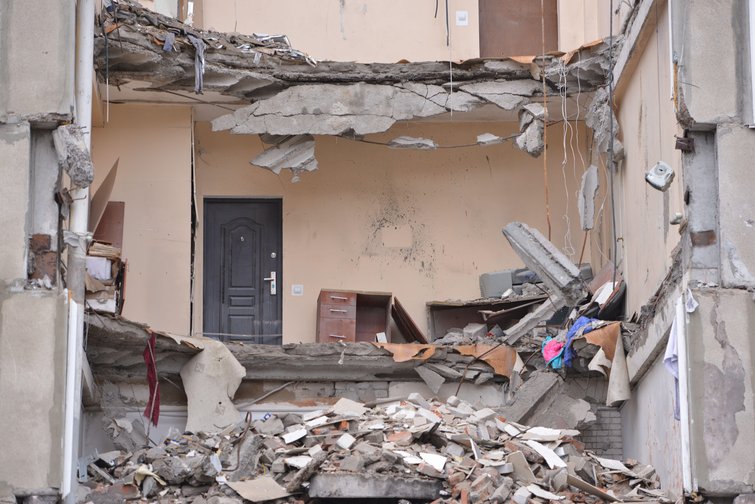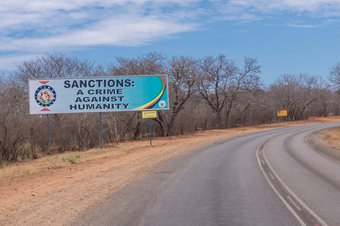OPINION: Experience of Western war and colonialism in the Global South change perspectives on the conflict in Ukraine
Paul Rogers
11 February 2023,

Russian destruction in Ukraine mirrors Western attacks on Raqqa and Mosul |
Thomas Krych / Alamy Stock Photo
The Russian war in Ukraine is in full swing, with military budgets surging across NATO, Russia and beyond. In the space of barely a week, NATO’s arming of Ukraine has already moved on from tanks to fighter aircraft.
The tanks will start arriving in the next couple of months. Meanwhile, as last week’s column reported, Putin’s call-up is adding up to 300,000 more troops, many of them raw conscripts. Russian arms factories are reported to be working on triple shifts to keep up the flow of munitions, and while there may be problems getting high-tech components from abroad, Russia has plenty of capacity for producing basic materiel such as shells for heavy artillery.
On the NATO side, Poland has been given the go-ahead from the White House to buy $10bn-worth of multiple-launch rockets, including the HIMARS system, and is planning to build its own HIMARS factory. And Lithuania has become the third of the Baltic states, after Estonia and Latvia, to order the same system.
With multiple conflicts and potential conflicts around the world, it really is a very good time to be involved in the arms industry. Look at the violence across the Sahel and the Horn of Africa; tensions between North and South Korea; the burgeoning arms market in the Gulf states, not least for the war in Yemen; and always remember the useful new threat from China. Whatever the impacts on people at the point of delivery, business for the armourers within the war-promoting hydra is booming.
Now, to cap it all, a brand new Cold War between Russia and the West is underway, meaning prospects for military spending are looking good for a decade or more.
One thing that is missing from the reporting of this latter conflict in the mainstream Western media is much sense of attitudes across the Global South. While it may seem to be a straightforward ‘good guys versus bad guys’ scenario, even a cursory look shows a very different interpretation in much of the world. There simply isn’t the universal support for the West and opposition to Russia that many Westerners assume.
When Russia crossed the border into Ukraine a year ago, votes in the UN showed majority condemnation, but as the war intensified, the way that governments had voted was not representative of public moods in many countries. Instead, while condemnation of the Russian assault tended to be strong, it was bound up with a sense of ‘a plague on both your houses’.
A few days after the war started a year ago, openDemocracy published a prescient article from an East African perspective. Contrasting with NATO’s belief in the ‘good fight’, Khatondi Soita Wepukhulu pointed out: “The rest of the world has experienced NATO, Europe and the US in other ways than ‘good’ – and we are allowed to express the anger and scepticism that highlights hypocrisy and calls for caution about Western solutions.”
She placed these views in their historical context: “All African countries (apart from Ethiopia and Liberia) were colonised, our homes cut up and shared like cake among European powers at the Berlin Conference of 1884-85 and in later years. The result? Some of the bloodiest subjugations in human history. No African country was ever colonised by members of the former USSR.”
Related story
An African view of what’s happening in Europe
3 March 2022 | Khatondi Soita Wepukhulu
Africans support the Ukrainian people, but centuries of experience also make us wary of ‘solutions’ by our former colonisers
Across the Middle East and North Africa, this kind of experience is even more recent. Twenty-four-hour reporting in the Western media has covered many of the appalling atrocities carried out by Russian troops, but you could scour the mainstream media in vain for coverage of similar incidents perpetrated by invading Western troops from the Iraq or Afghan wars. This does not mean there were none – a few such incidents came to light at the time, and more have emerged since. But many of these are thanks to Wikileaks and Julian Assange, currently facing deportation to the United States.
Among the exceptions to the lack of coverage are two specific reports by highly regarded Western war correspondents that were published at the time, rather than long afterwards. Writing in The Washington Post in April 2004, Pamela Constable reported an incident in which Marines rescued troops from a convoy that had been ambushed in the Iraqi city of Fallujah. The US troops suffered casualties but not deaths, but the Marines ordered a devastating response that night, with AC-130 Spectre gunships flattening a six-block area of the city, virtually destroying the area. It was described as a “punitive raid”.
Two years later, Tom Lasseter reported in the Houston Chronicle on the aftermath of an ambush by paramilitaries of soldiers from the 101st Airborne Division. Again, the US forces took casualties but not deaths, but their response was to tie two of the corpses of the insurgents to the front of their jeeps and parade them through the nearby town. As they did, Lasseter reported that “Iraqi families stood in front of the surrounding houses. They watched the corpses ride by and glared at the American soldiers.”
The Marines and the soldiers of the 101st Airborne believed they were fighting terrorists in a just war linked to 9/11, which was still very fresh in their minds. But to the Iraqis, the Americans were violent occupiers being resisted by brave young defenders.
In Ukraine, Russian troops have flattened towns and large parts of cities, but six years ago the US-led coalition in the anti-ISIS air war flattened the old city of Mosul in northern Iraq. Even now, recovery continues to be slow as “children play in bomb craters”.
After Mosul, the US/UK/French coalition moved on to Raqqa in Syria, the focus of ISIS control, and reduced much of the city to ruins. A joint analysis by Amnesty International and Airwars concluded that at least 1,600 civilians had been killed in the assault.
There may not be direct equivalence, and some Russian behaviour has very likely exceeded the worst that took place in the Western wars in Iraq, Syria, Afghanistan and Libya, but it is easy to forget the overall impact of the wars.
According to the Costs of War programme at Brown University’s Watson Institute for International and Public Affairs, “Over 929,000 people have died in the post-9/11 wars due to direct war violence, and several times as many due to the reverberating effects of war.” The report says that more than 387,000 civilians were killed as a result of fighting, and the wars also created 38 million refugees and displaced persons. The conflicts were “accompanied by violations of human rights and civil liberties, in the US and abroad”. The report puts the US price tag for post 9/11 conflicts at over $8trn.
The Institute also reports that deaths as a direct result of war in Afghanistan and Pakistan alone in the 20 years to August 2021 ran to 243,000, including over 70,000 civilians. Note the emphasis is on direct deaths. The indirect deaths from hunger, malnutrition, cold, lack of medical facilities and other factors will be very much higher.
For the general reader across the Western world, little of this would be recognisable unless they are in the minority who follow the few outlets that dig beyond the mainstream media. But these stories and statistics will resonate with readers across the majority of the world, and perhaps help explain those radically different world views on the war in Ukraine.

No comments:
Post a Comment